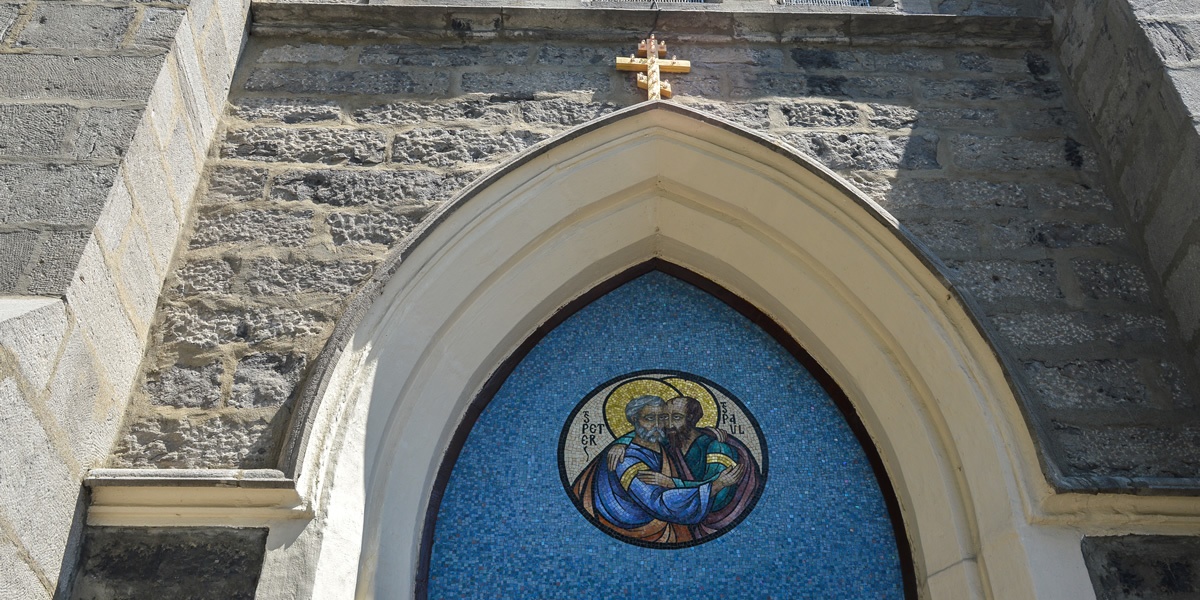Dr Paul Ladouceur & Prof Richard Schneider, Orthodox Church in America
The reason for being a Christian is Christ. Father Alexander Men, a remarkable Russian priest assassinated in 1990, says that “one thing alone proves the uniqueness of Christianity, namely, Jesus Christ.” Whereas every great world religion is a path towards God, “a vector pointing upwards from below,” Christ is “a vector coming from heaven towards us”: God incarnate in human flesh coming to demonstrate divine love for humans and to invite humans to respond with their freely given love, to work towards and ultimately to achieve union with him (theosis). The Fathers from Irenaeus onwards summarised this notion in a few words: “God became man in order that man might become God.” Jesus is “the Way and the Truth and the Life” (Jn 14:6). Jesus shows us that he is indeed the Way through his teachings in the New Testament, such as the Sermon on the Mount (Mt 5-7), especially the Beatitudes, teachings full of wisdom and compassion and light and love. Jesus is the Truth because he reveals the Holy Trinity: “Who has seen me has seen the Father… I will send the Paraclete to you…” (Jn 14:9; 16:7). Jesus is the Life because “I came that they may have life, and have it abundantly” (Jn 10:10). Alexander Men: “This is why Christianity is unique, because Christ is unique.”
Quotations from Alexander Men, Christianity for the Twenty-First Century: The Prophetic Writings of Alexander Men (Continuum, 1996).
The Orthodox answer to this searching question requires 25,000 words — or else 28: “One is a Christ(ian) because Christ is in the world; there is no other way to be. One sees the world through Christian eyes, because Christ — Christ crucified, Christ risen (1 Cor 1:23, 15:14 and the Paschal troparion) — is All-in-all.”
Blessed be God, Who has revealed Himself to us (liturgies and office, passim, cf. John 12:45).
All the rest is praxis — theoria and techne. The whole of any Christian life – including Orthodox Christian life — is a search for a hermeneutic that will reveal, unfold, announce the Truth of these 28 words.
The whole of the Christian life is spent on the Road to Emmaus. But we are never hopelessly in the dark, for Christ is in the world.
Reveal, unfold, announce – both to those “inside” the church (the Body of Christ) and also to those “outside” the Church (the true Body of Christ) – and by so revealing call life to conversion/convergence, theosis, i.e., the increasing recognition that Christ is our face in the mirror. Conversion to Christian theoria (John 14:7 et passim) is to recognize the All-in-all in past-present-future; it is to live in the eschaton — to put on Christ (Romans 6:3-4 and the troparion: “As many as are baptized into Christ have put on Christ) — today (Psalm 117/118:24). Conversion is confession, and that, too, is theoria, seeing oneself clearly in the light of Christ, recognizing that we are the Pharisee when we should be the Publican, that we are the Prodigal Son (first two lectionary Sundays at the start of the Triodion of Great Lent).
The techne of being a Christian in our living-in-the-world is simply constant striving, with God’s grace, to turn the Insights (Bernard Lonergan) granted by our increasingly theoria-seeing eyes into the quotidian realities of our praxis. Christian life in all of its aspects — liturgical, charitable, oekonomic – is really applied theoria, trying to figure forth Christ-in-ourselves (Gen 1:26-27, Coloss 1:15, et passim), to reveal, unfold, announce that besides Christ there is no other way to be, that our face in the mirror – that every face in the mirror — is Christ, that theosis has re-painted us (Athanasius De Incarnatione) as the eikon of God.
“Why be a Christian?” is, for the Orthodox, not a question – it is a fact of life, THE only fact of life; all else is a derivative. The real question is HOW. How can I always recognize the theoria through which the eyes of my body see through the enlightened eyes of my heart (Eph 1:18)? And hence, the next question is how should I pray, and what is my prayer? And hence, how should I love? And such real, existential questions about being the Christian that I MUST be — there is no other way — enable me to cope with the Christian life, and even in the dark woods of the Road to Emmaus, God’s mercy (Psalm 50/51: 1 et passim) will open my lips (idem vs. 15), and I can reveal, unfold, announce, to the entirety of the true Body of Christ, that God is love (1 John 4:7-12 and ff.).
What validity the Orthodox Church claims in teaching “being a Christian” in the world derives from the Tradition, the “Handing-On” (traditio, paradosis) of Christ’s commission to be apostles (Matthew 28:18-19), to be witnesses (martyres Acts 2: 32) and to love one another (John 15:9-12). What validity the Orthodox Church claims as the voice of the eschatological Truth of “being a Christian” will be known by its fruits in the fulfillment of this commission (John 15:16, the gospel text seen in many Pantokrator icons).
O God, teach me Thy statutes (Psalm 118/119:48 and the All-Night Vigil passim).








